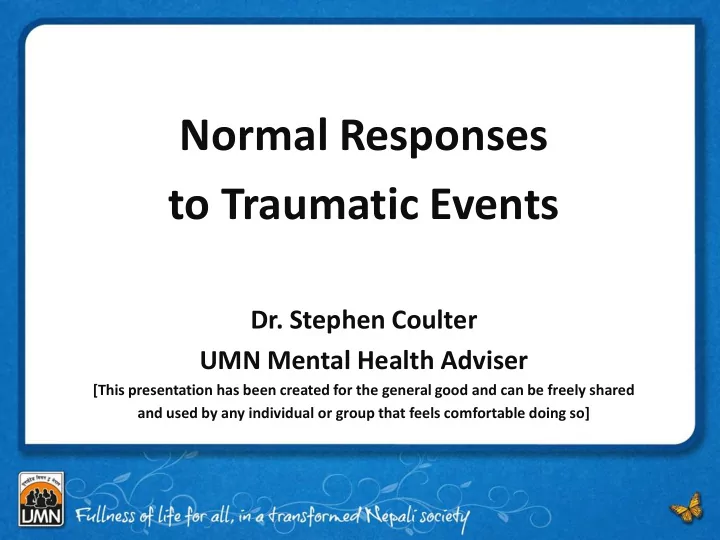

Normal Responses to Traumatic Events Dr. Stephen Coulter UMN Mental Health Adviser [This presentation has been created for the general good and can be freely shared and used by any individual or group that feels comfortable doing so]
Overview • What is Psychological Trauma? • Range of Normal Responses • How it affects Children & Families • How to Help Recovery • Time for Questions
What is Psychological Trauma? • ‘Trauma’ – means a wound • Psychological trauma is a wound to the ‘Psyche’ or mind • Just a physical wounds heal over time by natural means so too wounded minds heal through natural processes • Traumatic events can wound our minds due to the overload of sensory information about something outside our usual experience that hits us in a short space of time.
Important to Remember that: • Full recovery (in weeks or a few months) is the normal outcome for people who have experienced a traumatic event • In the beginning most trauma symptoms protect us from being overwhelmed. They only become a problem if they don’t go away • Children can learn coping skills that will help them in the future when they meet other difficult situations • Reactions can be delayed. Particularly at risk are those who have immediately had to take on significant responsibility for family, friends, and within organisations
Normal Responses 1 1. Intrusive Symptoms Recurrent involuntary memories Traumatic nightmares Flashbacks Emotional distress after exposure to things that remind you of the traumatic event Odd bodily sensations & pains
Normal Responses 2 2. Avoidance of Things that Remind you of the Traumatic Event Trying to block out Trauma-related thoughts or feelings (sometimes by use of drugs/alcohol) Avoiding reminders e.g. people, places, activities, or situations associated with the traumatic event
Normal Responses 3 3. Changes in Thinking and Mood Cannot remember some parts of the traumatic event Negative beliefs e.g., ‘I am bad’, ‘I am to blame’, ‘The world is completely dangerous’ Feelings of fear, horror, anger, guilt, or shame Reduced interest in (pre-traumatic) significant activities e.g. work, hobbies, sports, schoolwork Feeling cut off from other people Feeling emotionally numb (not experiencing negative or positive emotions)
Normal Responses 4 4. High Arousal of the Nervous System Irritable or aggressive behaviour Self-destructive or reckless behaviour Hyper-vigilance Exaggerated startle response Difficult to concentrate Sleep disturbance
But... Please note... ‘ Not all psychological injury can be encompassed by a list of symptoms or disorders. Trauma can alter the very meaning we give to our lives, and can produce feelings and experiences that are not easily categorized in diagnostic manuals.’ Briere and Scott (2006, p. 17)
Peoples’ Biggest Issues After Trauma can be: • Anger • Guilt • Blame • Shame • Questions about the meaning of life • Depression • Relationship Difficulties
Impact on Children World has become a frightening place – loss of ‘sense of safety’ They want to stay close to parents/relatives Poor concentration - underachieving at school Return to behaviour expected of a younger child Become more naughty or disobedient Repetitive and/or destructive play
Impact on Parents Less available to meet child’s physical and emotional needs (because they are pre-occupied with their own issues) Don’t want their children to go out as normal (i.e. away from them) Can become too lenient in their management of their children's’ behaviours
Impact on Families • Family members can feel isolated • Difficulty in talking about the traumatic event • May have missing a member(s) • More arguing due to increase in irritability • Confusion - when different people respond in different ways and recover at different speeds
How to Help Recovery 1 • Love the ones you are with • Encourage talking (without forcing it) • Don’t make unrealistic promises to your children • Make your home a safe as possible • Try and re-establish normal routines (as far as practicable) • Try and maintain good self-care
How to Help Recovery 2 • Make some allowance for your children‘s behavior – but still maintain good behavioral boundaries • Don’t worry about having trauma symptoms (even though they can be distressing) - just manage/experience them – give it time • If symptoms don’t go away in 6 -8 weeks consider seeking professional help
Time for Questions
Recommend
More recommend